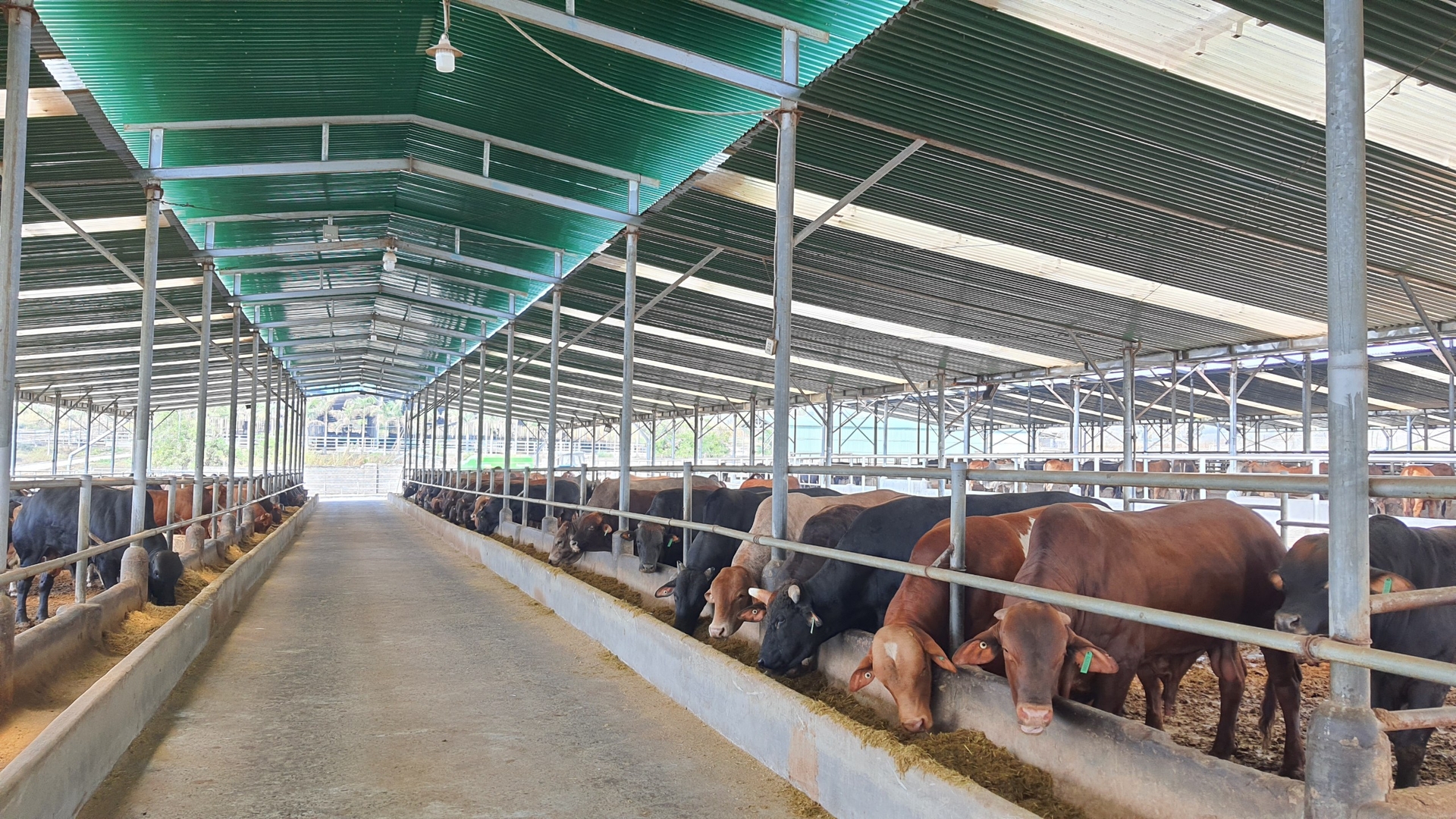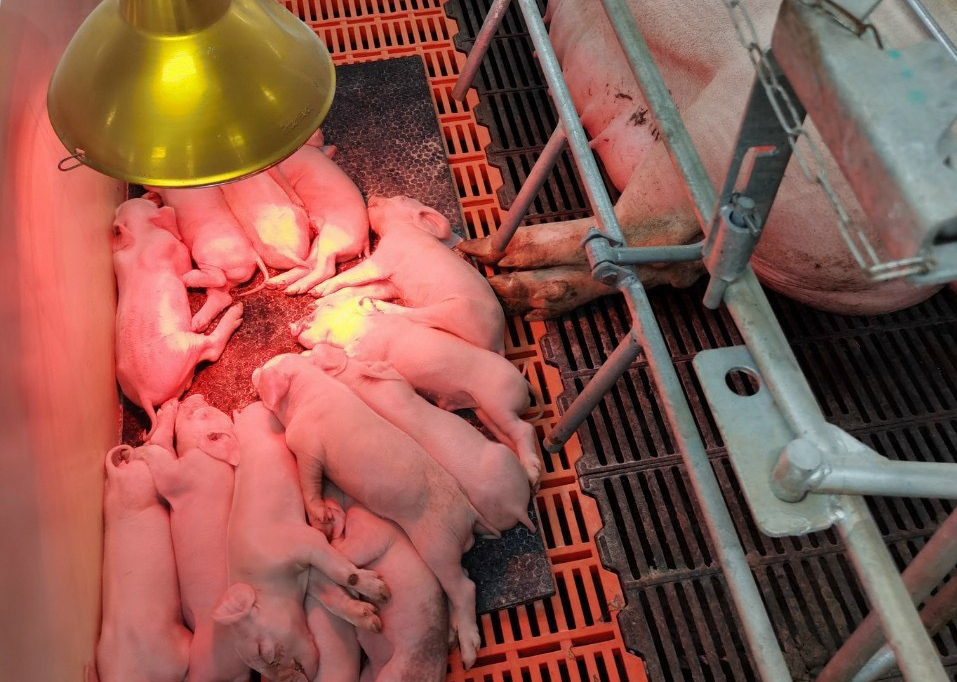June 2, 2025 | 13:57 GMT +7
June 2, 2025 | 13:57 GMT +7
Hotline: 0913.378.918
June 2, 2025 | 13:57 GMT +7
Hotline: 0913.378.918
Mr. Tran Ngoc Son, Deputy Director in charge of the Dak Lak Department of Animal Husbandry and Veterinary Medicine, said that Dak Lak is a province with one of the top animal husbandry scales in the country.
Specifically, the buffalo and cow herd is in the top 9; the poultry herd is about 13.6 million heads, ranking in the top 7; and the pig herd is currently about 960,000 heads, in the top 5 out of 63 provinces and cities.

Dak Lak is a province with one of the top husbandry scales in the country. Photo: Hong Tham.
Dak Lak has been determined to be a pioneer province in developing livestock production towards building disease-free facilities and zones.
Dak Lak Provincial Party Committee has issued a Resolution on the livestock development program for 2020 - 2030, with an orientation to 2045.
On that basis, the People's Committee of Dak Lak province also issued Plan 1199 to develop livestock production according to the Government's livestock development program.
"Currently, Dak Lak has built more than 40 disease-free livestock facilities and is building a safe area in Cu Mgar district. We determine that building disease-free livestock facilities and areas is an inevitable immediate and long-term direction for the Dak Lak livestock industry to ensure efficiency and sustainability in the increasingly growing trend, deeply integrating with the world," Mr. Son added.
Mr. Tran Ngoc Son expressed concern that the Central Highlands provinces and Dak Lak have chosen the right direction, but what must be done to become the center of biosafety and epidemic-safe livestock farming?
According to Mr. Son, there needs to be synchronization of the apparatus according to the Veterinary Law, legal documents, and the direction of the Government. To perform well according to the Veterinary Law, the staffing of civil servants and public employees must ensure that they meet task requirements.
Besides, livestock enterprises investing in Dak Lak have enjoyed relatively preferential policies, especially land rent exemption and reduction policies. However, land funds for livestock development are facing difficulties.
Land in Dak Lak, especially in remote communes, is mostly agricultural. According to the 2007 planning of the People's Committee of Dak Lak province, areas originating from forest land are challenging to convert. This issue still has many problems and needs to be re-planned and approved by the Central Government.

Regarding the construction of disease-free livestock facilities, businesses have met the requirements, while farming households still face many difficulties. Photo: Hong Tham.
In addition, for the construction of epidemic-safe livestock facilities and areas, businesses have responded. However, there are still many difficulties for small livestock and farming households, although the Provincial Party Committee Dak Lak has Program No.13 to develop the collective economy. The Government has also issued Decree 98 on supporting businesses, organizations, and individuals participating in livestock production activities...
“Dak Lak is a province where small households raise the majority of livestock, but this livestock farming still contributes to ensuring people's income and social security. Therefore, we must determine that this is a historical issue.
Vietnam is transitioning from a country with a low average income to a high average income level, so we must be synchronous, have policies to support small-scale livestock farming, and bring them into cooperatives and cooperative groups to raise small livestock but not odd if you stand in an organization, the efficiency will be better," Mr. Son emphasized.
In a context where animal diseases are at risk of recurring, replicating biosafety livestock models plays an essential role in the livestock industry. This model also benefits farmers by saving costs, improving production efficiency, protecting livestock, and contributing to reducing environmental pollution.
Biosecurity in livestock farming is measures that include techniques and management of livestock herds to prevent and limit the spread of biological factors of natural or human origin that harm the health and safety of humans, pets and the surrounding environment.
Mr. Tran Ngoc Son, Deputy Director in charge of the Dak Lak Department of Livestock and Veterinary Medicine, said that the Dak Lak livestock industry still has shortcomings that must be resolved to develop effectively, sustainably, safely and effectively to ensure a circular economy; In which the key issues are mechanisms and policies.
Translated by Tuan Huy

(VAN) TTC AgriS and IFC signed a strategic partnership to develop a sustainable agricultural value chain, aiming to achieve the Net Zero target by 2035.

(VAN) Seafood by-products are opening a new path, combining green growth and technological innovation to enhance the industry's value.

(VAN) Mr. Nguyen Thanh Cong, Vice Chairman of the Son La Provincial People's Committee, reflects on Son La’s journey from barren hills to fruitful orchards after a decade of hard work.

(VAN) FAO’s Director-General addresses the 5th Baghdad International Water Conference.
/2025/05/26/1716-4-nongnghiep-191706.jpg)
(VAN) Chain linkages, technological innovation, and raw material zoning are three strategic pillars for the coconut industry to strongly develop and elevate its position on the global agricultural map.
![Advanced mariculture – an inevitable trend: [4] Accompanied by scientists](https://t.ex-cdn.com/nongnghiepmoitruong.vn/608w/files/sohk/2025/05/13/1941-pgsts-vo-van-nha-140958_717.jpg)
(VAN) According to Assoc. Prof. Dr. Vo Van Nha, Director of the RIA III, the development of advanced offshore mariculture is no longer an option but an essential path for Vietnam’s fisheries sector.

(VAN) Vietnam is intensifying the development of mollusk farming areas that meet international standards, aiming for sustainable growth and enhancing its export position in the global seafood market.